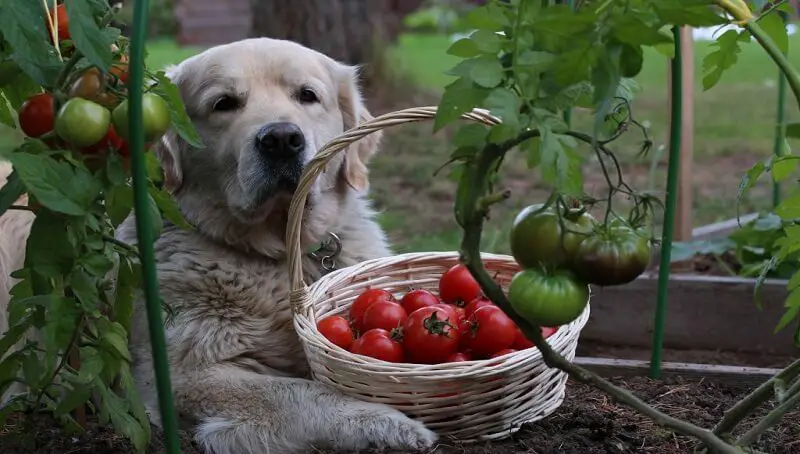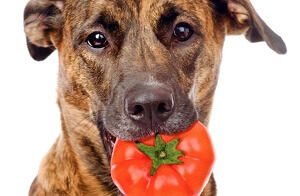
Why Do Chameleons Change Their Colors?
November 10, 2022
Why Is My Cat Always Hungry?
November 11, 2022
Many dogs tend to eat their owners’ food, whether it is good for them or not. Tomatoes are part of the category of food most often consumed by us, regardless of season, raw or cooked, in various sauces and preparations. While tomatoes are safe for humans, for dogs some parts of these vegetables can be toxic.
Specialists say that tomatoes should be given to dogs in moderation, otherwise serious digestive problems with undesirable manifestations can occur.
According to the U.S. Department of Agriculture, Americans individually consume more than 10kg of tomatoes per year, and yes, most of them are from ketchup and tomato sauce. In Europe, this number is a bit smaller but not by much.
A less shocking fact is that where there is food, there is also your dog, and you might wonder whether you can share the delicious tomatoes with your canine friend.
Experts agree that while your dog may enjoy a few pieces of tomato from time to time, you’ll probably want to keep him away from your garden, and here’s why.
The danger of tomatoes for your dog
Tomatoes are part of the Solanaceae vegetable family. These plants, including peppers, eggplants, and potatoes, contain potentially toxic elements, but may also have edible parts. This means that although tomato fruits contain some health benefits for your dog and can be offered as an occasional snack, the rest of the plant can be toxic.
Tomatine is a toxic substance found in tomatoes and is related to solanine, the toxic substance found in other Solanaceae. When consumed in large quantities, tomatoes can be poisonous to our beloved pets.
You might also like my articles on whether dogs can eat bacon bits, chili beans, or potatoes.
The good news: tomatine is concentrated in the green parts of the plant, especially in the flowers and stem. The small amount of tomatine present in ripe tomatoes is considered safe for dogs. Green tomatoes have more tomatine, but the difference is insignificant.
However, unripe tomatoes and tomato plants can be dangerous for dogs and you should keep your dog away from any growing tomato plants. In most cases, dogs should eat a significant amount of these to have negative health consequences, but some dogs are more sensitive than others and it is better to protect them than to be sorry.
Caution!
Pet owners should keep in mind that the flowers, leaves, and stems of tomatoes contain potentially dangerous amounts of tomatine for dogs. However, it is unlikely that your four-legged friend will eat enough of the plant to lead to problems. Large herbivorous animals such as cows have the highest risk of poisoning on tomato plants. Keep an eye on your dog whenever he has access to your garden.
Side effects of tomatine consumption in dogs
The most common symptom of tomatine poisoning is gastrointestinal disorder, which shows symptoms such as diarrhea or vomiting. But, if dogs consume large amounts of tomatoes, they may also experience symptoms such as lethargy, loss of coordination, seizures, and other symptoms like muscle weakness or even behavioral changes and an abnormal heart rate. In this case, you will need to seek veterinary treatment immediately.
Just like in humans, tomatoes can also worsen certain gastrointestinal problems, such as gastric reflux, so it’s always a good idea to consult your veterinarian before giving tomatoes to a dog. Tomatoes happen to be a common allergen in humans, and although it’s rare, your dog might have a similar reaction.
If your dog is able to eat a large portion of an unripe tomato or tomato plant, watch for the following symptoms:
- Excessive salivation
- Lethargy
- Apathy
- Weakness
- Tremors
- Increased or irregular heartbeat
- Lack of coordination
If you notice any of the above symptoms, take your dog to your current veterinarian immediately. Also, if you decide to give your dog a fresh tomato, make sure it is clean and free of any pesticides. Tomatoes grown in your own garden are the best, but they should still be washed well.
What about tomato sauce, ketchup, and other tomato-based products?
If your dog loves fresh tomatoes, keep in mind that they may show interest in the slice of pizza or the spaghetti you eat. Tomato sauces, ketchup, soups, or juices are not particularly healthy for dogs due to the addition of salt and sugar, as well as artificial flavors or other chemicals they may contain. However, small amounts of tomato-based products like homemade tomato sauce will not cause harm to your dog.
What about boiled tomatoes?
 There are a ton of products that contain cooked tomatoes, including sauces, soups, or juices, and they are best to be avoided. Most cooked tomato products will contain added preservatives, sugar, spices, and other harmful ingredients that can cause problems in your dog. I strongly recommend that you create your own products with cooked tomatoes, so you know what they contain.
There are a ton of products that contain cooked tomatoes, including sauces, soups, or juices, and they are best to be avoided. Most cooked tomato products will contain added preservatives, sugar, spices, and other harmful ingredients that can cause problems in your dog. I strongly recommend that you create your own products with cooked tomatoes, so you know what they contain.
The benefits of tomatoes in dogs
When ingested in small amounts, tomatoes offer some health benefits. Tomatoes are full of nutrients, such as carotenoid lycopene and beta-carotene, which are powerful antioxidants that can help prevent cell damage.
These low-calorie fruits are also high in fiber, which helps with digestion. Tomatoes are rich in vitamins A and C which can help improve vision and promote your pet’s healthy skin.
How to give tomato to your dog
When you give your dog a tomato, you’ll want to look for ripe tomatoes, cherry tomatoes and similar varieties are OK if they have their stems and leaves completely removed. While many people prefer salty tomatoes, this additive can be harmful to your dog. The safest way is to serve your dog the simple tomato, washed thoroughly, and cut into small pieces.
Start by giving just one bite or two to see how your dog reacts. If they enjoy eating tomatoes and have no side effects, do not hesitate to give them occasional small amounts as a reward.
